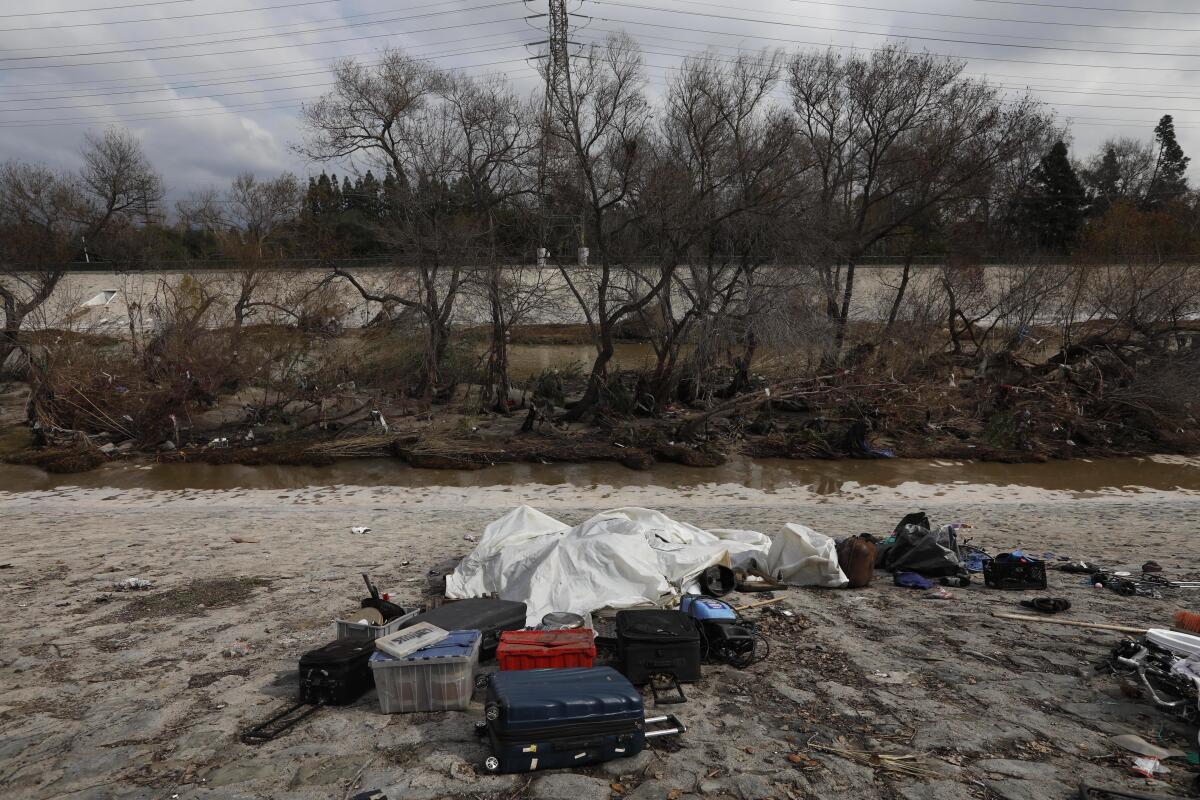Op-Ed: A letter to the cyclist who rode by the Atwater bridge on the L.A. River

- Share via
On the morning of Sept. 15, I received a message on the communication platform used by the homeless advocacy organization I work with. It said that C., an associate of ours who lives on an island in the Los Angeles River, needed to contact her case manager about her general relief benefits and food stamps in the next 24 hours. I agreed to go look for her.
A little while later, I got a follow-up message: C. is dead.
This is how the unhoused die, suddenly but not unexpectedly. Homelessness is a terminal condition if untreated, and C. is one of nearly a dozen acquaintances who have died on the streets in the last few years.
Another outreach volunteer and I headed down to the river to offer C.’s longtime partner, T., our condolences. We found him in his usual spot just south of the new horse bridge, which connects Atwater Village and Griffith Park. Huddled against the metal barrier, obstructing one of the two lanes of bike path, we listened while he told us the events leading to C.’s death. Chest pain on Monday, a trip to the hospital, her rapid decline, the estranged children he’d attempted to contact, the final sad moments of her passing. All this he relays in a flat, almost indifferent, tone, mute evidence of a life so filled with horror that even the sudden death of his lover elicits no outward expression of surprise or strong emotion.
These were the circumstances when you, spandex-clad and biking south along the river, yelled at the three of us to get out of the path, to which I responded with a predictable vulgarity.
I was surprised when you returned to insist that I apologize for my foul language and for forcing you to shift lanes. You seemed genuinely certain you were the injured party, and I imagined you carrying that for the rest of the day — telling your friends about the confrontation, using it as an example of our ongoing civilizational decline.
Believe it or not, I too am the sort of person who might yell at someone for obstructing a bike lane, or for littering, or for any of a hundred other acts which degrade our civic cohesion and worsen our shared neighborhoods. People shouldn’t block bicycle lanes or ride motor scooters on sidewalks. People shouldn’t litter or scribble profanity on bus benches or start fires in trash cans or leave heroin needles and crack vials lying around for other people to step on. People shouldn’t be allowed to suffer on the streets while the wealthiest society in history swirls around them. The sick shouldn’t go untreated, the impoverished shouldn’t go without food.
Things shouldn’t be like this. I took your behavior as evidence that you, like many of my neighbors, view unhoused people exclusively as nuisances, similar to bad traffic on the 5 or our most recent oat milk shortage.
Maybe this was unfair. Maybe you didn’t see that my partner and I were helping a member of the unhoused community, though we wore shirts identifying ourselves as outreach volunteers. Maybe your comment was, as you insisted, entirely civil. If I was wrong, then you’re owed an apology and you have it. But I don’t apologize for prioritizing the needs of the most vulnerable members of society over convenience for the prosperous and comfortable.
The citizens of this city are furious at the homeless crisis. They should be — it is a daily disgrace that we allow it to continue. But to focus our frustration on the symptoms rather than the causes of this crisis is both cruel and foolish. Sweeps and special enforcement zones, these things very obviously do nothing but push the problem a few hundred yards down the road. You wanted us to move out of the bike path, but T. has nowhere else to go.
The solution to this problem must come from those powerful enough to effect change; it is obvious that the unhoused lack this capacity. Maybe I did you an injustice. If so, come out with me one weekend to the L.A. River, and meet some of the people who live along your biking route. Otherwise, should you see me some other day on the side of the river, trying in some small way to help T. or someone like him, I’d suggest you pump your brakes and pass in silence.
Daniel Polansky is a writer living in Los Angeles.
More to Read
A cure for the common opinion
Get thought-provoking perspectives with our weekly newsletter.
You may occasionally receive promotional content from the Los Angeles Times.










